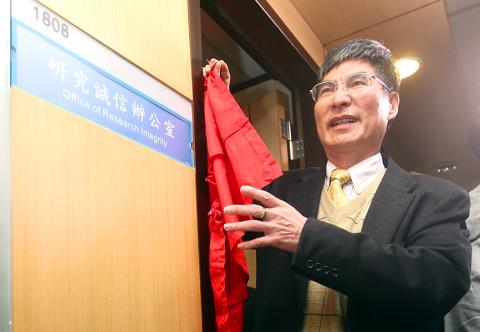The Ministry of Science and Technology yesterday announced the establishment of an Office of Research Integrity to collect big data and provide a reference for future academic studies.
The office will not deal with the National Taiwan University (NTU) scandal alleging academic fraud, the ministry said.
Minister of Science and Technology Chen Liang-gee (陳良基) unveiled a sign and announced the launch of the office, which was based on the US’ Office of Research Integrity, with the expectation that researchers conduct themselves with integrity and conform to academic ethical standards.

Photo: CNA
“The office is to collect information on research integrity from other countries, including case scenarios and treatment solutions, and publicize them for research project heads,” Chen said.
The office is to create a database of different types of breaches of academic integrity to serve as a reference for case reviews, Chen said, adding that he hoped the office could help academia return to its original function — seeking the truth.
NTU president Yang Pan-chyr (楊泮池) is under investigation as the coauthor of several scientific papers containing allegedly fabricated results.
“I feel deeply distressed,” Chen said about the scandal, which was exposed at the end of last year.
An academic ethics review committee is investigating Yang and is expected to announce the results in a couple of weeks, Chen said.
The new office will not interfere with review, but will include the case into its database for reference, he added.
Chen spoke about the two main issues the office is taking on, including actively dealing with cases and changing the academic research environment to establish better ethical standards, as well as cultivating internationally competitive research personnel and attracting top talent from other countries.
Chen has proposed sending at least 50 Taiwanese with doctorate degrees to established companies or start-ups in Silicon Valley that have already agreed to recruit more than 50 people.
The ministry also plans to invite senior researcher abroad to hold short-term courses in Taiwan.
The ministry proposed an investment of NT$5 billion (US$162 million) in artificial intelligence, as well as establishing a scalable high-performance computing platform, international innovation and research center, and three to four mass artificial intelligence research bases.

Chinese spouse and influencer Guan Guan’s (關關) residency permit has been revoked for repeatedly posting pro-China videos that threaten national security, the National Immigration Agency confirmed today. Guan Guan has said many controversial statements in her videos posted to Douyin (抖音), including “the red flag will soon be painted all over Taiwan” and “Taiwan is an inseparable part of China,” and expressing hope for expedited reunification. The agency last year received multiple reports alleging that Guan Guan had advocated for armed reunification. After verifying the reports, the agency last month issued a notice requiring her to appear and explain her actions. Guan

GIVE AND TAKE: Blood demand continues to rise each year, while fewer young donors are available due to the nation’s falling birthrate, a doctor said Blood donors can redeem points earned from donations to obtain limited edition Formosan black bear travel mugs, the Kaohsiung Blood Center said yesterday, as it announced a goal of stocking 20,000 units of blood prior to the Lunar New Year. The last month of the lunar year is National Blood Donation Month, when local centers seek to stockpile blood for use during the Lunar New Year holiday. The blood demand in southern Taiwan — including Tainan and Kaohsiung, as well as Chiayi, Pingtung, Penghu and Taitung counties — is about 2,000 units per day, the center said. The donation campaign aims to boost

The Kaohsiung Tourism Bureau audited six hotels in an effort to prevent price gouging ahead of Korean band BTS’ concert tour in the city scheduled for Nov. 19, 21 and 22 this year. The bureau on Friday said that the audits — conducted in response to allegations of unfair pricing posted on social media — found no wrongdoing. These establishments included the local branches of Chateau de Chine, Hotel Nikko, My Humble House, and Grand Hai Lai, it said, adding that the Consumer Protection Commission would have penalized price gougers had the accusations been substantiated. The bureau said the Tourism Development Act

BACK TO WINTER: A strong continental cold air mass would move south on Tuesday next week, bringing colder temperatures to northern and central Taiwan A tropical depression east of the Philippines could soon be upgraded to be the first tropical storm of this year, the Central Weather Administration (CWA) said yesterday, adding that the next cold air mass is forecast to arrive on Monday next week. CWA forecaster Cheng Jie-ren (鄭傑仁) said the first tropical depression of this year is over waters east of the Philippines, about 1,867km southeast of Oluanpi (鵝鑾鼻), and could strengthen into Tropical Storm Nokaen by early today. The system is moving slowly from northwest to north, and is expected to remain east of the Philippines with little chance of affecting Taiwan,